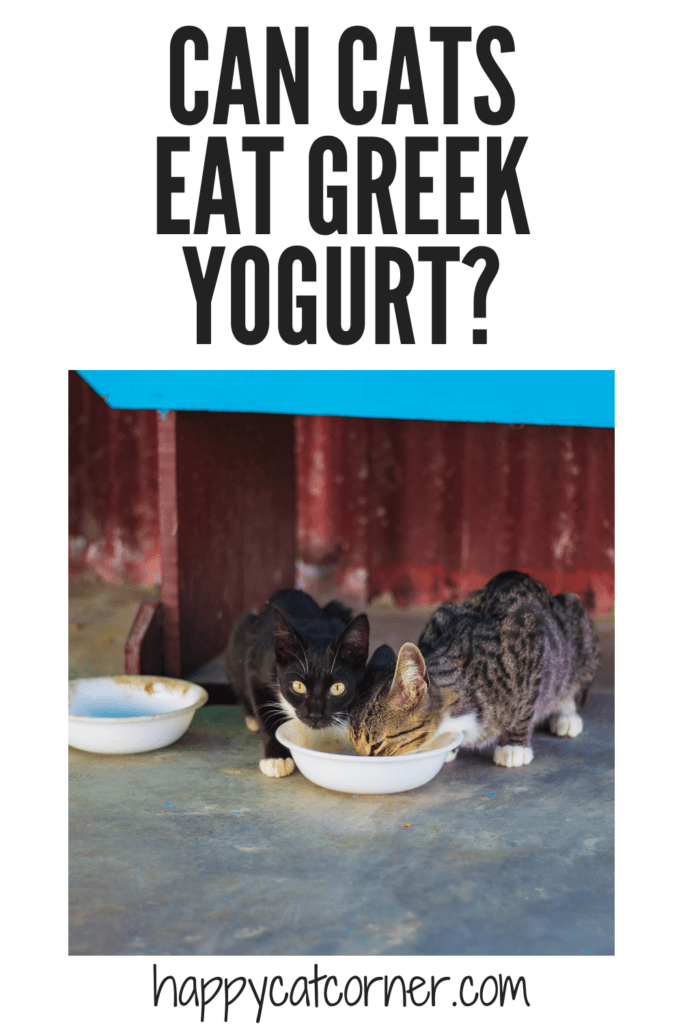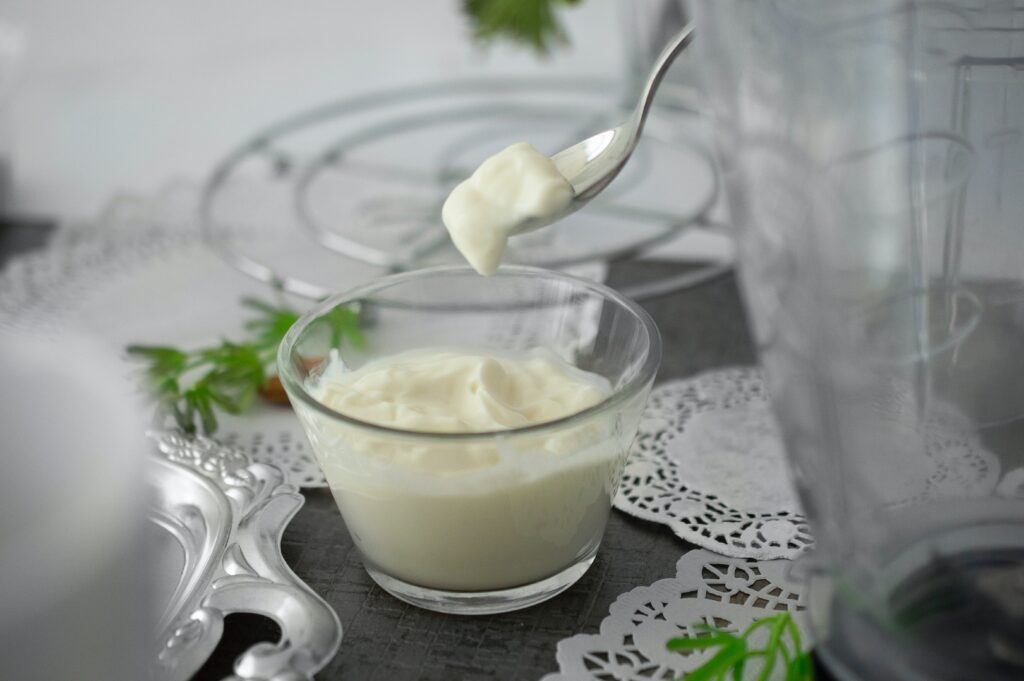This post may contain affiliate links. This means I may receive a small commission if products are purchased through them. All opinions are honest and remain my own.
My cat loves to lick yogurt out of the bowl if I leave it out. Really this is true of any creamy dairy products like ranch, whipped cream, milk… you name it! But just why are cats so obsessed with dairy? Can cats eat Greek yogurt (or any yogurt)? Will it harm them in some way?

Is Greek yogurt safe for cats?
Greek yogurt is OK to give cats in small quantities. It contains very little lactose compared to some other dairy products, and also has active cultures that make it easier to digest. Just make sure you give them plain yogurt since any flavored varieties (even vanilla) contain a lot of added sugars.
Why do cats love yogurt?
Many (but not all) cats love yogurt – Greek or otherwise – mostly because of the fat and protein content. They can actually smell these and that’s why they are attracted to them (a cat’s sense of smell is 14 times stronger than ours).
However, they may also just be attracted to the smooth and creamy texture or to the taste. This is also true for other dairy products like milk, cream, and cheese.
Cats’ nutritional needs
You may have heard often the phrase that cats are “obligate carnivores” – this means they obtain all their nutritional needs from meat and they require it for survival. If cats ate a strictly plant-based diet, they’d develop severe and potentially deadly health effects from malnutrition.
However Greek yogurt has plenty of protein, moisture, and healthy probiotics, which could benefit your cat if just given in small amounts (just a tablespoon or so).
Still, any yogurt given should be served as a treat in addition to your cat’s normal diet, and not be used as a regular meal replacement.
Cats and lactose intolerance
It’s usually not recommended to give cats any dairy products because many are lactose intolerant, although that exists in varying degrees. Some cats will get very sick after ingesting the tiniest bit of diary, and others will show no symptoms at all.
Some cats are able to tolerate milk, cheese, yogurt, and other dairy products OK, especially in smaller amounts. However, it’s always best to test with the tiniest amount first, and then wait at least a day to see if they develop any symptoms.
Noticeable symptoms of lactose intolerance in cats:
- Diarrhea
- Constipation
- Gas
- Vomiting
- Lethargy
If you notice any of these symptoms after giving yogurt or other dairy products to your cat, you will know not to let them have them anymore (even if they beg!)
Although yogurt (especially Greek yogurt) contains much less lactose than regular milk and cream and is more easily digested because of the active cultures within it. Therefore, most cats will be able to tolerate small amounts of it better than they would other diary products.
Greek vs. regular yogurt and cats
Greek yogurt (aka strained yogurt) is different from regular yogurt because the whey is strained out. This not only gives it a denser consistency but also removes much of the lactose – the part that’s not so good for many cats.
Removing the whey (where the lactose comes from) means a serving of Greek yogurt only has around 4 grams of lactose, while some types of regular yogurt can contain many times that amount.

This means that Greek yogurt is deemed “lactose intolerant friendly”, and is less likely to cause any digestive issues in cats. However, even regular yogurt is better for lactose intolerance than plain milk since the live cultures help to break down lactose and it’s more easily digested.
Because of the way it’s made, Greek yogurt also has a lot more protein. It’s quite comparable to a serving of lean meat – 17g – so it can be a good alternative protein source.
However both varieties can be made with lots of sugar, so it’s not great for your cats to have anything other than the plain type.
Is flavored yogurt safe for cats?
Any flavored yogurt – even if it’s the Greek type – has a lot of added sugars. This means it’s not the best choice for your cat.
This includes the type of yogurt with fruit on the bottom, and vanilla flavored yogurt as well. Even though vanilla is commonly confused with plain, it is totally different. If you were to taste vanilla and plain yogurt side by side, the plain version is much sourer and not very sweet.
But even if you personally don’t prefer plain, it’s likely your cat won’t mind. According to this study discussed by NPR, cats lack the receptor for sweetness and therefore, are unable to even taste it.
While a little flavored yogurt is not harmful to your cat, plain is just a much healthier option. If your cat prefers flavor – mix in some blueberries or strawberries instead.
How much Greek yogurt is safe to give a cat?
Plain Greek yogurt is the safest option for your cat as it has little sugar and not much lactose, but you still should not overfeed it.
You can start with a teaspoon or a few licks and see how they react. If they take to it with no side effects, you can safely give them a tablespoon (or two) as a treat. Just make sure not to give much more than that, and not every day, because too much may cause digestive issues.
Can cats eat low-fat or fat-free yogurt?
As long as it’s plain, a low-fat or non-fat yogurt is ok since cats fed a healthy diet don’t need the fat anyway. Just watch out for artificial sweeteners, as those tend to be commonly used in those types to help with flavor, especially in the flavored versions. If you stick with plain yogurt, it shouldn’t contain any artificial sugars.
Will yogurt help a constipated cat?
Some unofficial advice online says you should give your cat a tablespoon of plain yogurt each day to help cats with constipation. The reasoning for this is that some yogurt contains probiotics (aka “good” bacteria) which can potentially help to keep the digestive tract healthy.
While giving a cat yogurt for constipation won’t necessarily harm them, it may not help either and could potentially make the situation worse. Not all yogurt has added live and active probiotics (you must read the label) and sometimes, too much dairy can actually cause constipation.
There’s also not really enough evidence or studies that exist to show just exactly how effective (or which types) of probiotics are the most beneficial for treating digestive issues, and especially not any that have been done with cats.
While there is all sorts of advice out there as to how to treat a cat with constipation, the best advice is to first consult your vet. Constipation is often a symptom of another issue that can be diagnosed and treated with the help of your vet. Another important reason to seek medical care in these situations is it’s possible your cat could have a blockage and need additional intervention.
The Bottom Line
Unlike other dairy products, yogurt, especially unflavored Greek yogurt, can be safe and healthy to feed your cat in moderation. Just make sure to give it as a treat and not an all the time thing!

Leave a Reply